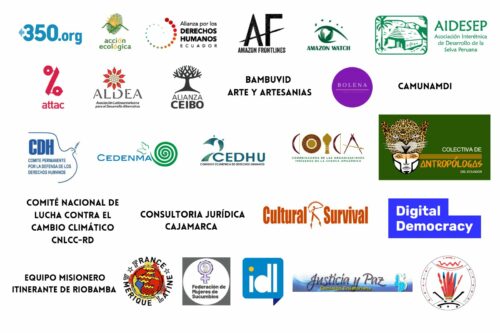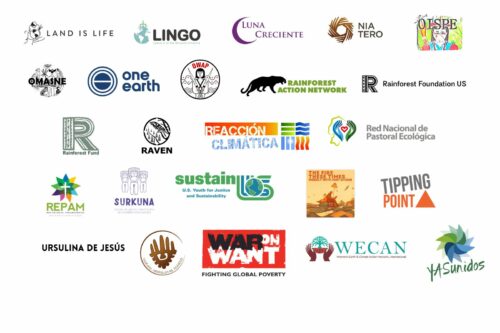Esteemed judges,
We are at a historic crossroads. Today, you hold our existence in your hands. The decisions you make will directly affect the survival of our people. We want to explain to you why the right to our ancestral territory is essential for us as Siekopai people, and why the justice system must respond to the ongoing violations of our collective rights.
In light of the unprecedented political crisis that we are facing in Ecuador, we also want to emphasize our deep concern. Over the coming months, President Guillermo Lasso’s rule by decree not only risks undercutting our country’s democracy, it also risks favoring economic interests and violating Indigenous rights, threatening our territories like never before. Our country’s most vulnerable sectors – and in particular, Indigenous peoples, will be the first to be impacted. There has never been a more important time to defend and protect the rights and territories of Indigenous peoples.
Pëkëya, also known as Lagartococha, is our ancestral home. It is the place where the bones of our ancestors are buried. It is the gateway to the other worlds, and in the Siekopai worldview, it is the place where our elders were born. Among them is Cesario Piaguaje, our beloved grandfather-shaman, who died a few weeks ago and who fought his whole life to be able to return to his birthplace. All our elders have taught us the value of this sacred place: only here, in the heart of our ancestral territory, can we continue the transmission of our culture to the younger generations. Only in the territory of Pëkëya, far from the noise of industries and the city, can we develop our knowledge, continue drinking yagé in ceremonies, and maintain the essence of our culture; these are the things that allow us to continue existing as Siekopai people.
We are a nation of about 823 members, with our own culture, our own language, our own wisdom, our own traditions, and our own systems of knowledge, including forms of dialogue that we have inherited from our ancestors and that allow us to be in communication with nature. But today, as the Siekopai nation, we face cultural extinction. Threatened by extractivism, by an educational system that has been imposed on us, and by a government that does not respect our right to go back to our own land and territory, we are on the verge of disappearing as a culture and as a people.
This struggle has continued for many generations. Our ancestors and elders began the struggle, and we have continued it. We have spent more than 80 years suffering the pain of displacement and trying to find a way back to living in our territory of Pë’këya without fear of violence. Outsiders enslaved us and forced us out of our territory, and we were further displaced by a war that had nothing to do with us. We had to flee so as not to be exterminated.
During many years, elders like Cesario sought to get our land back and return to our territory of origin. In 1993 and 1995, we began to make our struggle to recover Pëkëya more visible. Our intention was to return, but since the Ecuador-Peru war was going on in our ancestral territory, no one paid any attention to us. In 1998, when a peace agreement was reached, we were initially told that we would be able to return to our territory. Our people were overjoyed and wanted to re-establish our community in our ancestral territory immediately, but we were shocked to discover that the territory was being managed by the Ministry of the Environment (at that time it was called the National Institute of Protected Areas). Despite making legal petitions, we were not able to achieve recognition of any right to our territory. So, our struggle for territorial rights began. We made attempts to return to our territory, reestablishing communities and plots of cultivated land, but they were later destroyed. We continued to make every effort to gain recognition for our right to return and get our land back, without any success.
We have done everything possible to present all the evidence regarding our struggle in a language and format that the government authorities can understand: we created a map of sacred sites, with the rivers, the ancestral pathways, the waterways, and the lagoons, as well as the names we call them in our language. We did an anthropological and ethnographic study. We waited for a response from the Ministry of the Environment for five years, but after four changes of ministers and various bureaucratic processes, nothing happened. Finally, we took legal action, only to face additional obstacles.
Although in principle Ecuador is a plurinational and intercultural state, the issue of interculturality is not taken into account by the justice system. Indigenous nations and the collective power of communities are not respected. To offer one example among many, it has been requested that a single person should represent us in this collective legal action, despite the fact that such a request ignores the logic and the form of self-government maintained by Indigenous peoples. So we realized that the justice system does not recognize legal pluralism. Even the infrastructure and the physical spaces for carrying out the processes of the justice system in Ecuador are not designed to consider collective power; they offered us little rooms for eight people, rather than a collective assembly area where we could fit 200 people to dialogue between Indigenous authorities and State authorities.
The judicial system must be decolonized. The principles of colonialism remain entrenched, and the essence of colonial power remains in force. We hope that the judges will come to understand and recognize our right to our territory, because of the urgency of the threats we face, and in light of the requests of our elders and the duty to make reparations for colonial violence.
Now is the time for this to be resolved. Esteemed Judges: You have a unique opportunity to address a historic injustice. You have a choice before you: you can either rescue the Siekopai – or you can bury us. That is the level of responsibility wielded by the judges of this Court.
We are not just fighting for a piece of land. At stake are the lives and the existence of the Siekopai people, and the future generations of the Siekopai. The rights of nature are also at stake, because there are spirits of the forest residing in Pëkëya. At stake is the equilibrium and the relationships between the Siekopai and other beings. If we do not recover Pëkëya, our younger generations will not have access to the spiritual link between themselves and the non-human beings of the forest.
At stake is the aquatic world of Pëkëya, a kingdom of water, which has been preserved and protected by the Siekopai people. And due to climate change, the entire fabric of life around the globe, throughout all the worlds in which we live, is also at stake.
Pëkëya is the center of our world. We ask you to allow us to exist, which requires protecting the connection of the Siekopai people to our territory. We are connected with the water, with the forest, with the leaves, with the roots, with the birds, and with the spirits. All of these relationships form a fabric that may not make sense from a Western perspective. But we know that the fabric of these relationships is what sustains the world.
Esteemed judges, we hope that you will hear us, that you will evaluate all the scientific and anthropological evidence that we have presented, and that you will understand the depth of the ancestral connection between our people and the territory of Pëkëya. Do not contribute to the disappearance of our people and our culture. Make the right decision to restore our rights, to give us back our land, and to protect the history of our future.
In support and solidarity, the following civil society organizations signed this letter:


- 350.org
- Acción Ecológica
- Alianza de Organizaciones por los Derechos Humanos del Ecuador
- Amazon Frontlines
- Amazon Watch
- Asociación Interétnica de Desarrollo de la Amazonía Peruana
- Attac France
- Bambuvid arte y Artesanias
- BOLENA
- Camunamdi
- CEDENMA
- Cedhu
- Colectiva de Antropologas
- Comisión Ecuatoriana de Justicia y Paz.
- Comité Nacional de Lucha Contra el Cambio Climático, CNLCC-RD
- Comité Permanente por la Defensa de los Derechos Humanos
- Consultoria Jurídica CAJAMARCA
- Coordinadora de Organizaciones Indígenas de la Cuenca Amazónica – COICA
- Cultural Survival
- Digital Democracy
- Equipo Misionero Itinerante de Riobamba
- Federación de Mujeres de Sucumbíos
- France Amérique Latine – FAL
- Fundación ALDEA
- Fundación de Mujeres Luna Creciente
- Instituto de Defensa Legal
- Kako Earth
- Land is Life
- Leave it in the Ground Initiative (LINGO)
- Nia Tero
- OMASNE
- One Earth
- Organización Indígena Secoya de Perú – OISPE
- OWAP (Organización Waorani de Pastaza)
- Rainforest Action Network
- Rainforest Foundation
- Rainforest Fund
- RAVEN – Respecting Aboriginal Values and Environmental Needs
- Reacción Climática
- RED ECLESIAL PANAMAZÓNICA ECUADOR
- Red Nacional de Pastoral Ecológica
- Surkuna
- SustainUS
- The Fire These Times
- Tipping Point UK
- Unión de Afectados Por Texaco UDAPT
- Ursulina de Jesús
- Vicariato de Aguarico
- War on Want
- Women’s Earth and Climate Action Network
- YASunidos




